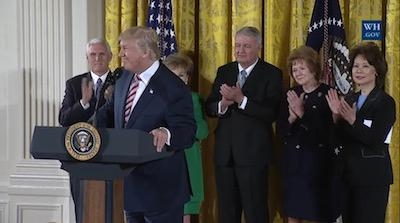Proposal Details Released Following Trump Announcement
Shortly following Monday's announcement by President Donald Trump about plans to privatize Air Traffic Control in the U.S., the White House released what it characterized as an overview of the President's "Principles for Reforming the U.S. Air Traffic Control System". According to the document, the system is intended to be funded entirely by user fees to be implemented over the next three years.

The document states that the new nonprofit ATC entity "should be financially self-sufficient through the collection of user fees that cover both its costs of operations and recapitalization. The aviation taxes that currently cover these costs should be sunset, except for those necessary to continue to fund the Airport Improvement Program. General fund revenues should fund the rest of the FAA.
"Users should have input in the fees and their structure, which should be guided by ICAO principles and be consistent with the international obligations of the United States. Except national-security users (including DoD aircraft, DoD-contracted flights, and foreign military aircraft), diplomatic users (including non-commercial United States Government and foreign sovereign State aircraft), and public safety users, all users should pay their fair share.
"To ensure that rates are just and reasonable, however, users should have the ability to request review by the Secretary of Transportation, rather than the Congress. Any determination by the Secretary of Transportation should be final.
"The transfer of ATC operations from the FAA to the new entity should be completed within an established 3-year transition period overseen by the Secretary of Transportation. The transition period should be marked by milestones developed and monitored by the Secretary of Transportation, in coordination with the Secretary of Defense, to ensure adequate progress. The transition period may be extended only with the approval of the President."

According to the White House, ATC reform presents an exciting infrastructure improvement opportunity, and its completion will demonstrate early progress toward much needed infrastructure reform across all sectors. The Administration’s principles for reforming ATC will drive legislation that will reduce delays, further improve aviation’s leading safety record, protect access to rural communities, and accelerate much needed capital investment. These principles insulate one of our most important national assets from political interferences and the crippling effects of budget uncertainty, while keeping intact FAA’s critical safety oversight. Additionally, they preserve essential working relationships and interoperable capabilities with the Department of Defense (DoD), the Department of Homeland Security (DHS), and law enforcement agencies that are critical to ensuring the safety and security of the Nation.
“This proposal demonstrates that the Federal Government does not have to supply all of the resources required to develop and maintain our Nation’s vast infrastructure. Often, it simply needs to remove obstacles hindering investment and innovation. The new ATC entity envisioned in these reform principles will be self-sustaining, financed through fees paid by the users of the NAS. These fees will be more efficient and less burdensome than the patchwork of aviation taxes that supports the system today.
“The time has come to embrace a bolder vision of what our Nation’s ATC system can be and how best to move forward to achieve it. In 2016, House Transportation and Infrastructure Committee Chairman Bill Shuster introduced the Aviation Innovation, Reform, and Reauthorization (AIRR) Act to move ATC from the Government to a not-for-profit, independent entity. The Administration supports the proposed AIRR Act as a good foundation for reforming the ATC system, and believes the legislation can be improved. Accordingly, the Administration supports the enactment of legislation that incorporates the principles detailed in this document,” the statement reads.
(Source: White House news release)
 ANN's Daily Aero-Term (12.13.25): Light Gun
ANN's Daily Aero-Term (12.13.25): Light Gun Aero-News: Quote of the Day (12.13.25)
Aero-News: Quote of the Day (12.13.25) NTSB Final Report: Gippsland GA-8
NTSB Final Report: Gippsland GA-8 Classic Aero-TV: Historically Unique -- Marlin Horst's Exquisite Fairchild 71
Classic Aero-TV: Historically Unique -- Marlin Horst's Exquisite Fairchild 71 Airborne 12.12.25: Global 8000, Korea Pilot Honors, AV-30 Update
Airborne 12.12.25: Global 8000, Korea Pilot Honors, AV-30 Update




